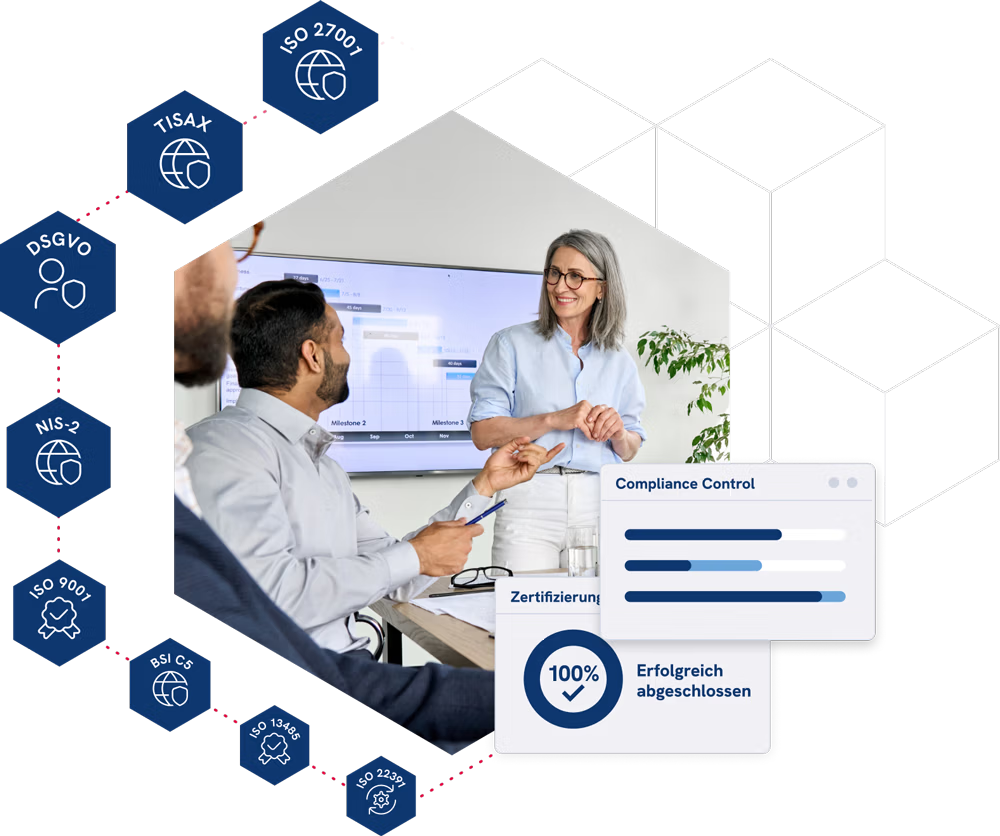Warum Compliance im
Mittelstand oft komplizierter ist,
als sie sein müsste
Wenn Sie wie die meisten Compliance-Verantwortlichen sind, kennen Sie die folgenden Herausforderungen:
Ihr Compliance-System ist umfangreich, aber im Alltag kaum nutzbar
Policies, Schulungen und Excel-Listen sind vorhanden, aber niemand weiß, wie das alles zusammenhängt. Die operative Umsetzung bleibt Stückwerk.
Die nächste Prüfung steht an, aber es fehlt die Sicherheit, ob wirklich alles abgedeckt ist
Anforderungen aus ISO-Normen, IT-Security oder Datenschutz existieren parallel – aber ein prüfbarer Gesamtüberblick fehlt.
Verantwortlichkeiten sind unklar
Zwischen Fachabteilung, QM, IT und Geschäftsleitung entstehen Reibungen, weil Steuerung, Zuständigkeiten und klare Prozesse fehlen.

Compliance
darf leicht sein
& Spaß machen
Wenn Sie für die Compliance in Ihrem Unternehmen verantwortlich sind, tun Sie vermutlich schon eine ganze Menge: Sie erstellen Richtlinien, organisieren Awareness-Schulungen, dokumentieren sauber – und trotzdem bleibt oft ein Gefühl der Unsicherheit nicht, weil Sie etwas falsch machen sondern weil es an einem System fehlt, das Maßnahmen, Anforderungen und Zuständigkeiten intelligent verknüpft – und Ihnen das Gefühl gibt, jederzeit alles im Griff zu haben.
Genau deshalb haben wir MEMEX gegründet. Wir entwickeln Compliance-Managementsysteme, die nicht nur formal überzeugen, sondern in der Praxis funktionieren. Strukturiert, prüfbar und so schlank, dass Sie im Alltag den Überblick behalten.
Denn wir sind überzeugt: Der Zweck von Compliance ist nicht, nach außen hin Eindruck zu schinden, sondern einzig und allein die rechtlichen Anforderungen zu erfüllen – und das im Idealfall so einfach, effektiv und zeitsparend wie nur möglich.
Mit diesen Lösungen machen wir
Ihr Unternehmen compliance-fit
Informationssicherheitsmanagementsysteme (ISMS)
Zertifizierungsreif zur ISO 27001 oder TISAX® – mit einem ISMS, das Risiken minimiert, Prozesse klar definiert und Ihre IT entlastet.
Datenschutzmanagementsysteme (DSMS)
Strukturiert, DSGVO-konform und auditfähig: Ihr DSMS entsteht ohne internen Overhead – und schützt Daten und Reputation gleichermaßen.
Sie sind unsicher, welches System zu Ihrem Unternehmen passt?
Dann buchen Sie jetzt Ihre kostenlose Erstberatung und wir finden es gemeinsam heraus.
… oder erfahren Sie hier mehr zu unseren Leistungen.
Compliance-Managementsysteme
von MEMEX liefern das,
was Sie sich wünschen
100% Kontrolle, 0% Komplexität
Ob Berichtspflichten oder ISO-Normen: Sie wissen immer, was als Nächstes passiert – wir kümmern uns um die termingerechte und prüfbare Umsetzung.
Mehr Zeit für das Wesentliche
Wir schaffen Struktur, wo heute noch Reibung entsteht: Mit klaren Zuständigkeiten, nachvollziehbarer Dokumentation und verlässlichen Prozessen.
Auf Anhieb zertifiziert
Unsere Systeme sind auditfähig, durchdacht und punktgenau entwickelt. So überzeugen Sie nicht nur Prüfer – sondern auch Geschäftspartner, Stakeholder und Investoren.

So entsteht Ihr
maßgeschneidertes
Compliance-Managementsystem
Schritt 1
Unverbindliche Erstberatung
In einem kostenfreien Gespräch analysieren wir gemeinsam Ihre Situation, Ziele und Anforderungen – und zeigen Ihnen, wie ein passendes System für Ihr Unternehmen aussehen könnte.
Schritt 2
Konzeption & Umsetzung
Sie erhalten einen klaren Plan, einen festen Ansprechpartner und ein auf Ihr Unternehmen zugeschnittenes System. Wir kümmern uns um Konzeption, Dokumentation, Integration und Auditvorbereitung.
Schritt 3
Erfolgreiche Prüfung & Zertifizierung
Ihr Unternehmen geht bestens vorbereitet in jede Prüfung – mit einem System, das nicht nur heute, sondern langfristig funktioniert. Sie profitieren von Zertifizierungssicherheit, Planbarkeit und einem gesteigerten Vertrauen bei Kunden, Lieferanten und Investoren.
Warum MEMEX?
Jahre Erfahrung im
Compliance-Bereich
Reduzierung des Zertifizierungsaufwands im Kundendurchschnitt
Weiterempfehlungsquote
durch unsere Kunden
praxiserprobte Vorlagen
für reibungslose Zertifizierungsvorgänge
Was Sie bei
MEMEX bekommen
Mit MEMEX
- Ein fester Ansprechpartner mit Ergebnisverantwortung
- Passgenaue Systeme für Ihr Unternehmen
- Entlastung statt Überlastung
- Zertifizierungsreife statt Symbolpolitik
- Umsetzung in 3–6 Monaten
- Verständliche Sprache & praxistaugliche Realisierung
Mit anderen Anbietern
- Wechselnde Berater, unklare Zuständigkeiten
- Vorgefertigte Vorlagen & One-Size-Fits-All-Lösungen
- Theoretische Konzepte ohne Praxistauglichkeit
- Maßnahmen, die im Audit nicht standhalten
- Langatmige Projekte mit hohem Eigenaufwand
- Bürokratischer Overload

Setzen Sie einen
Haken unter das
Thema Compliance
Viele Compliance-Managementsysteme sorgen für Mehraufwand. Unsere Lösungen schaffen Freiräume. Mit MEMEX gewinnen Sie nicht nur Sicherheit im Audit, sondern auch Klarheit im Alltag – und zwar ohne, dass Sie sich Tag und Nacht mit dem Thema Compliance beschäftigen müssen.
Vereinbaren Sie jetzt Ihr kostenloses Beratungsgespräch und gehen Sie den ersten Schritt zu einem zertifizierungsreifen und praxistauglichen Compliance-Managementsystem.
Noch Fragen?
Hier finden Sie Antworten:
Der Aufbau eines Compliance-Managementsystems deckt sämtliche Prozesse, Zuständigkeiten und Richtlinien ab, mit denen Ihr Unternehmen gesetzliche, regulatorische und interne Anforderungen nachweislich erfüllt. Ziel ist es, Haftungsrisiken zu vermeiden und Audits sicher zu bestehen.
Eine gesetzliche Pflicht besteht nicht immer – ein Compliance-Managementsystem ist aber faktisch heute in vielen Fällen unverzichtbar: Kunden, Märkte und Behörden fordern heute lückenlose Compliance-Strukturen. Ohne ein prüfbares Compliance-Managementsystem wird es schwer, zertifiziert zu werden, Ausschreibungen zu gewinnen oder Haftungsrisiken auszuschließen.
Sie starten mit unserer kostenfreien Compliance-Beratung. Danach entwickeln wir auf Wunsch in enger Zusammenarbeit mit Ihnen ein System, das exakt auf Ihre Organisation zugeschnitten ist – egal, ob es sich um ISO-Normen, internen Vorgaben oder Branchenstandards handelt. Ihr Vorteil: Minimaler Aufwand für Ihr Team, maximale Prüfungssicherheit für Sie.
Nicht zwingend. Wir setzen auf praxistaugliche Lösungen und arbeiten in erster Linie mit den IT-Tools, die in Ihrer Organisation bereits vorhanden sind. Bei Bedarf empfehlen wir herstellerunabhängig passende Software-Lösungen, die Ihre Prozesse zusätzlich stärken.
Das hängt vom gewünschten Ziel ab: Für ein prüfbares, auditfähiges Compliance-Managementsystem sollten Sie mit etwa 3–6 Monaten Projektlaufzeit rechnen. Die eigentliche Umsetzung beginnt in der Regel bereits wenige Tage nach der Beauftragung.
Wir garantieren, dass unsere Systeme alle Anforderungen der angestrebten Norm erfüllen – und bereiten alles so vor, dass eine Zertifizierung ganz sicher gelingt. Das bedeutet auch: Wir gehen erst in die Zertifizierung, wenn Ihre Teams und Ihre Prozesse die Zertifizierungsreife erlangt haben.



